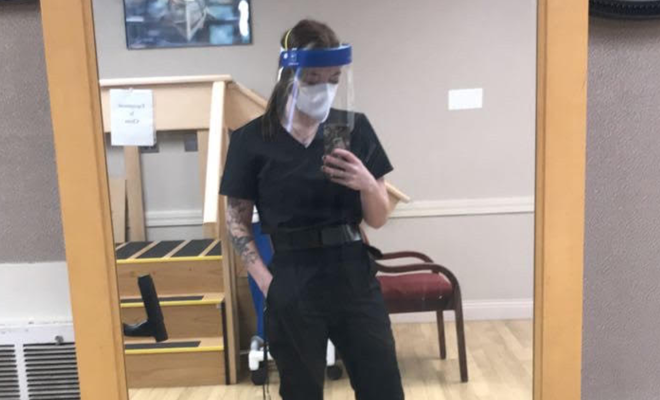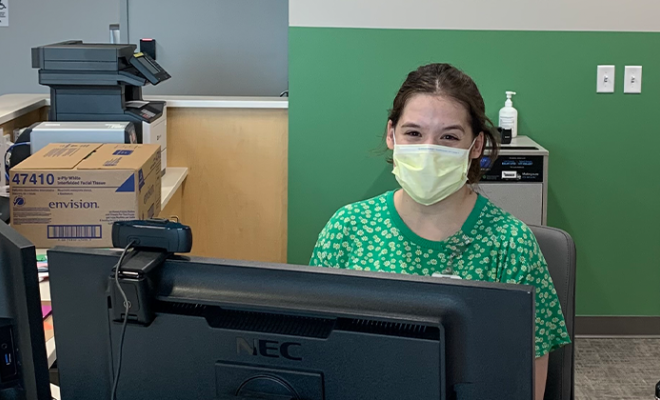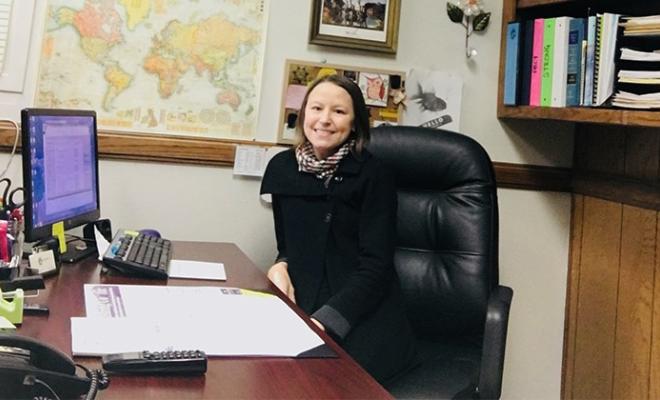Want to know a secret? My diagnosis didn’t even cross my mind when I decided on my occupational therapy assistant degree. Shocking, coming from the girl who references her cystic fibrosis for even the most mundane of decisions. If I make the 40-minute drive to Target, will I lose control of my bowels? Did I bring my pills for this taco date with friends, or am I in for a world of hate for work tomorrow? Do I have enough medication stockpiled in case the world ends? Okay, maybe that last one caters to my specific brand of mental illness, but you get my point.
In fact, CF affecting my ability to practice as an occupational therapy assistant wasn’t even a blip on the map until my second clinical rotation in a school, when I got sick for the third time in that eight-week rotation. I am one of approximately 10% of people with CF who have a nonsense mutation, meaning I’m not eligible for any of the modulators like Trikafta® that help so many others with CF live a semi-normal life. Because of this, it almost discouraged me completely from pursuing OT. If I’m getting sick this quickly in just a clinical rotation, how am I going to manage this in the real world?
Spoiler alert: I finished. I couldn’t accrue that much money in student loans for nothing. I started off slowly as a new clinician, working in inpatient and outpatient psych facilities. I’d figured psychiatry was the middle ground that CF and OT could share. To be fair, I wasn’t sick as much and I loved every minute of it. This worked for a few years until I was bitten by the travel bug and signed with a travel agent, who placed me in the hotspot of transmissible bacteria: a skilled nursing facility.
Working in sub-acute rehabs and skilled nursing facilities for around two years helped me pick up a few skills (and bugs) that have both changed who I am as a therapist and my personal relationship with CF.
- Tell your boss and coworkers as soon as you can. I quickly learned that I was going to be sick — a lot. For someone who is a relatively healthy person with CF, I’m blessed to even have the luxury of being sick a lot without landing directly in the hospital. But boy howdy, was I down for the count more frequently than my coworkers. What helped me the most? Being transparent with my boss and coworkers on the first day about my diagnosis. Having open communication about my weaker immune system, why my backpack sounds like a mini pharmacy, and my unique susceptibility to bacteria that wasn’t even on their radar made my day-to-day so much easier. That, and it stopped the looks of horror coming my way from coughing fits during COVID outbreaks.
- Establishing boundaries. You know what’s fun? Having to tell your boss you actually can’t treat the patient on your schedule today because they have Pseudomonas, and then having to explain why you’re especially attractive to that bacterium. Seriously, Pseudomonas will swipe right every time for CF lungs. But you know what’s important? Saying no. When I first started, I was scared to say “no” to treating patients. That landed me with COVID-19 my third week in — then the stomach flu, some variation of a cold and flu, etc. In order to be a good clinician and provide the best care possible for your patients, you have to make sure you’re taking care of yourself, too. Sometimes, that means saying no to certain cases, or limiting the amount of COVID patients you have that day. Don’t get me wrong, you’ll be treating sick people, but it’s important to make sure to stick to your health boundaries when something that directly affects your health pops up.
- Flexibility is important. First, because you really don’t want to pull a muscle transferring a patient. And second, CF will sometimes call the shots for you, and you have to be prepared with metaphorical flexibility. This circles back to my first guideline — when CF decides to rear its ugly head, it’s so much easier when your boss is already in the know. About a year ago, I started to get sick more than usual when I was working full-time an hour away from home. I was sick at least twice a week, going home early or calling out more often than I should have been, and missing work for appointments. I was always exhausted, constantly picking up little bugs that I could have fought off before, and having one medical issue after another. I was discouraged. Just a year prior, I could work full time no problem, and here I was shocked if I could make it a full week. I made the decision to drop from full-time to per-diem (as needed), and it made a world of difference. To be completely honest, I wasn’t the best at fitting in vest treatments in the mornings while working full-time. I could rattle off excuse after excuse, but at the end of the day, I felt I didn’t have time to do them. Exercising my metaphorical flexibility and transitioning to a few days a week opened up my schedule to fit in treatments, appointments, and rest days without comprising my job. Flexibility around treatment options, workdays, and hardships will help tremendously.
- You have a superpower. The call is coming from inside the house — or whatever the kids are saying these days. People with CF in the medical field have the unique perspective of being both the patient and the practitioner. We know how important it is for transparency and clear communication from our practitioner because we’ve spent years as the patient, confused by medical jargon and unclear explanations. We know how important it is to be an advocate for our patients’ wishes because we know how easy it can be to feel invisible to our provider. And best of all, we can really mean it when we say, “I know how you feel.” I don’t disclose my CF to most of my patients. But when an opportunity arises where it benefits my patient to tell them why I know exactly how they feel, it makes a world of difference.
Working in the medical field with CF isn’t easy. I’m learning everyday how to best balance my health and career. CF has made my role as an OT look a little different than most, but it has offered me a unique perspective that I wouldn’t have considered without it. If you’re passionate about something, don’t let CF stand in your way.
Interested in sharing your story? The CF Community Blog wants to hear from you.





